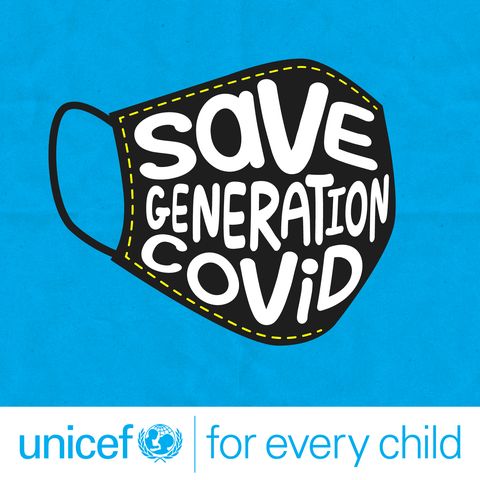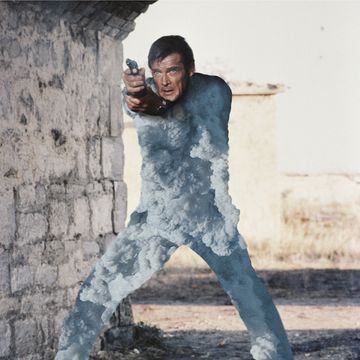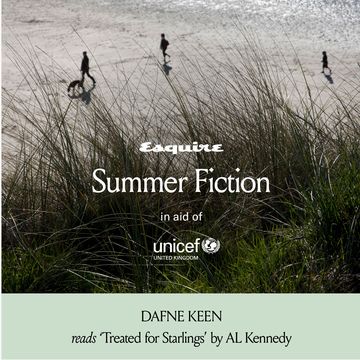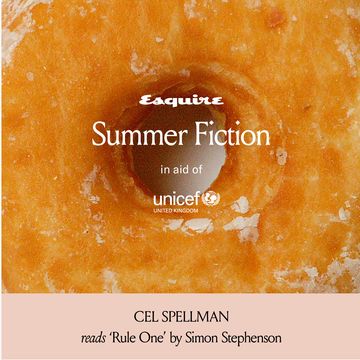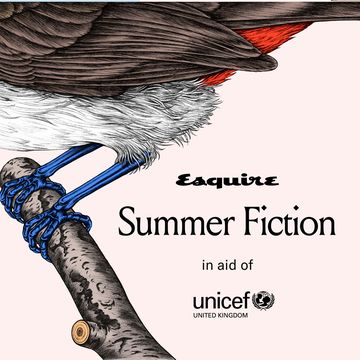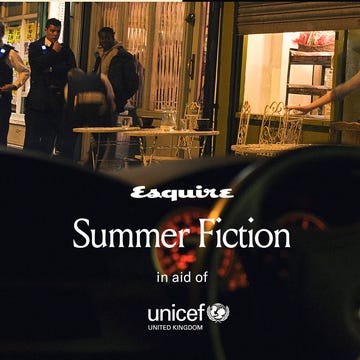Esquire's Summer Fiction series, in aid of Unicef UK, brings together some of the world's finest writers, and greatest actors, for a collection of original stories and readings that offer, we hope, a ray of light in these dark times, as well as the chance to raise funds for Unicef's Generation Covid campaign. (Read Unicef ambassador and Esquire editor-at-large Andrew O'Hagan's piece on why the campaign is so vital here).
Where a child is already experiencing hardship, outbreaks of diseases bring a new emergency to an already precarious situation. This is the story of Generation Covid. For vulnerable children all over the world, it poses the biggest threat since the Second World War. Please enjoy these stories, then visit Unicef UK's Generation Covid page to donate and hear a special message from Unicef UK Ambassador Jessie Ware.
DONATE NOW
Audio: read by Jessie Ware
To listen, click 'Unmute' in the video at the top of this page. Alternatively, listen and download on Soundcloud, or listen on YouTube.
'Let Mothers Doubt' by Yiyun Li
Narantuyaa spent the entire afternoon in the Louvre, counting animals. The previous day she had counted angels, stone and marble and bronze, in the Montparnasse Cemetery, but she had begun after a slow lunch, taken pictures of her favourites from several angles, so only covered three-quarters of the ground when the wet November dusk set in.
The simple action of naming the numbers, all in the right order, comforted Narantuyaa. Perhaps being alone, being in Paris, she had finally become one with her ancestors on the Mongolian steppe, who, their fates unaccountable, must have found reassurance in their countable livestock. But such a sentimental thought made her feel like a fraud. Narantuyaa’s parents were Mongolians from Hohhot, but few could tell them apart from ethnic Chinese. Thirty-five years ago, they had defected from a Chinese performance troupe after its first stop in San Francisco, along with the party secretary of the troupe and a few others. Narantuyaa’s mother, who had been a soprano, and her father, a morin khuur player, had since transformed themselves into the owners of a Chinese restaurant in a small town in the Central Valley. Narantuyaa, who had never set foot in Asia, was as American as Mongolian beef.
Narantuyaa wondered if she could go to the museum’s information desk afterwards and ask for the exact count of animals in the Louvre — painted, sculpted, real or mythical, hidden in a corner or featured prominently on a canvas. When one spends an afternoon looking for every cat and dog and horse and dove and rabbit and rooster and monkey and lion and fish, one at least deserves to know how close one’s tally is. But if she asked the lady at the desk, “Combien d’animaux sont ici?”, the woman might refuse to understand. She was there to offer directions to the lost, and answers to reasonable questions. Narantuyaa stepped into the drizzling dusk and thought, oh well, life doesn’t come with an information desk.
Narantuyaa had travelled to Paris alone because of one live man and two dead men. The tour book said that the population of Paris was over two million. Being among two million strangers made her feel that those three men were no more than dust motes.
In a notebook she bought for the Paris trip, Narantuyaa had made a few lists.
The unoriginal ones: sights to see, museums to visit, French dishes not to miss, chocolatiers for gift-shopping.
The ambitious ones: no emails, no peeking at Instagram and Twitter, no news websites. These she had failed daily.
The achievable ones: count the animals in the Louvre, take pictures of angels — sculpted or carved — in a cemetery, collect 22 chestnuts and bury them in a little grave.
Narantuyaa had been out of town the Memorial Day weekend when Jullian died, 22 years and a month old. The accident — at least that was how Narantuyaa’s parents preferred to think of it — had happened while he was camping with a few friends in Oregon. Overdose. One of the quickest ways to turn a young life into a data point. In the weeks after, when her friends invited her for a hike on the Russian River, when her co-workers went out for Friday afternoon drinks, she had declined. She did not mind that her temporary isolation had been mistaken for grief. Eleven years older than Jullian, Narantuyaa had brought her brother up more than their parents had, first on her back in the family restaurant, then helping him navigate a country in which their parents, even after they had received their papers, remained aliens.
Narantuyaa had been spending that weekend, as she had several others, with Mark at his vacation home overlooking the Tomales Bay. At the end of a winding road and surrounded by cypresses and pine trees, it belonged to Mark and his wife Kim, and the nearest neighbour was a hike away. When Narantuyaa and Mark spent the weekends there, they did not go down to the beach. They sat in the hot tub, made love on the couch, and watched movies that did not require intellectual conversation. When the fog came in, Mark would start a fire, and sipping wine in front of a lit fireplace in the summer made Narantuyaa feel romantic, even though she was not a romantic person. By nature she was lazy, having, she claimed, laboured long hours in her parents’ restaurant when she was young. A perfect weekend for her was to lounge on the sofa, waiting for the hummingbirds to visit the feeder on her balcony, checking her social media feeds, and thinking about nothing.
The affair that had begun over an after-work drink — he was a senior director, two floors up in the same building — had come with an expiration date. Kim was in Singapore, taking care of her newly widowed mother, who also needed surgery. Jullian’s death, like Mark’s marriage, was not given any space when Narantuyaa and Mark were together. There was no place for love in the affair. Cheaters they both were: he, on a wife; she, on the memory of a brother.
At a restaurant on Rue de l’Université, Narantuyaa was assigned a corner table in a small downstairs room. Over a glass of house white, she took her first peek of the day at her social media, where turkeys and pumpkin pies and bright-coloured centrepieces marched like contestants at a beauty pageant. And then there was the other march, of women speaking up about the men in the past — undesired and undesirable, though murkier situations and even minor incidents were sometimes turned into weighty encounters — a reminder that what Narantuyaa thought of as her personal choice had different meanings to those who were not her.
In college, she had been a work-study student in a lab, and a graduate student had once confronted her for not showing up at a protest about how the female students and the students of colour were represented in the science field. “You can’t just sit there waiting for us to fight for you,” the graduate student had said. “Intellectually and morally passive” a fellow student had called her, and all she had done, instead of defending herself, was to look at his hair and think how she hated the man bun as a fashion trend.
Mark’s trouble had begun in the fall, after two interns filed complaints. Right away, his interactions with the younger women at the company had to be re-examined: a kiss on the cheek, a pat on the back, a joke that might’ve been simply inept. The company was small enough that gossip spread quickly, yet large enough that a single rumour turned into several. Narantuyaa watched Kim continue to carry herself in an impeccable manner, always as elegant as a bird-of-paradise flower. What was happening in that marriage was beyond Narantuyaa’s imagination, but she had not extended her curiosity beyond the house at Tomales Bay. She had not believed then that she was doing anything to sabotage their marriage. All marriages are sabotageable, and they always crack from within.
One day, Narantuyaa had found an excuse to use the conference room on Mark’s floor. She did not run into him. In hindsight it was silly to want a sighting of him. What could she have said? That he need not worry, as she was a morally and intellectually passive person? That her laziness would be discretion enough?
A young woman entered the restaurant. Two waiters and the maître d’ kissed her cheeks and led her to a table next to the window. She wore light makeup, and a half-smile with a downward gaze as though she were listening to a tune that she alone could hear. She arranged her cashmere wrap, seemingly weightless, before she sat down. The table nearest to Narantuyaa was shared by an Italian couple, and the next one, a silver-haired American and his date. Both couples — and Narantuyaa too — watched the woman take her seat. When her wine arrived immediately, she smiled at the glass and then at her own fingers holding the stem, her entire physique arranged for the unmet eyes. Narantuyaa felt an urge to heckle her.
But Narantuyaa was not a heckler. A better way to laugh at mediocrity, she always thought, was to play along and feign admiration. She did not mind that the delight she had was for herself only. Nor did it bother her that people often thought of her as nice — meek, even. Let others live with their certainties about her. The further off the mark they were, the better she enjoyed it.
Few people knew this about her, but Jullian had seen through her. He had once told Narantuyaa that her biggest character flaw was that she took nothing seriously; worse, what’s taken seriously by others, she always turned into a joke that she wouldn’t share with anyone. You’re that stingy, he said. But I don’t like to share anything, she said; I grew up poor. We both did, he said.
Narantuyaa did not correct him: she’d grown up with nothing; he, with something. It takes only a little more than nothing for desires to encroach upon one’s life. That, Narantuyaa thought, was the difference between her and Jullian: one cannot desire what one doesn’t take seriously.
You should make more effort, Jullian had advised her. Look past people as though they are all radishes and cabbages, but once in a while, focus your full attention on a man and make him feel he’s interrupted your dream. Look at him like you don’t know if you should be annoyed or grateful.
When had Jullian stopped being a little boy and become an expert in every aspect of life? Narantuyaa was lucky — she had mothered him, yet she was not his mother, and he had grown up to be her closest friend.
Jullian had inherited their parents’ musical talents, and their rashness too. They had given up a relatively cushy life as performers in China, he exchanging his fiddle for a cleaver and a spatula, she the centre stage for a place behind the counter. Jullian could’ve gone to one of the UCs, but after graduating high school he’d decided to pursue a music career. He had always played the lead roles in the school musicals — wasn’t that enough? He had been good at singing and dancing, as their ancestors were. Harsh life breeds expressive talents, but their ancestors’ livelihood had come from their cattle and sheep. Devoting a life to being a musician didn’t make sense to Narantuyaa. Still, she found excuses to write a few cheques to him now and then, as she was certain that their parents had done too.
After Jullian died, their mother had said to Narantuyaa, “I wonder if any mother’s biggest failure is to give birth to a baby. Children always want what their parents can’t give.”
Children want what the world can’t give, Narantuyaa thought, but it’s a mother’s fate to doubt herself, so let mothers doubt.
“There’s nothing wrong that you’re not rushing into a marriage and having babies,” Narantuyaa’s mother said. She used not to hold that view.
Narantuyaa’s father wept often after Jullian’s death, but neither Narantuyaa nor her mother cried much. Perhaps they were truly nomads’ descendants. When wolves tear a sheep apart with their fangs, when a hawk carries a lamb away in its claws, what’s the point of shedding tears? One less in the flock, yet life wouldn’t therefore soften itself for those who remain.
When the young woman’s hors d’oeuvres arrived — before all the other tables received their orders, before her order had been placed — she looked into the waiter’s eyes and touched him lightly on his wrist. She arranged her fork and the knife, took a few pictures of the food with her phone, and repositioned her wine glass for a few more.
The Italians turned their attention back to each other; an older couple, they seemed to say things more with their eyes. The American, his voice loud enough for the room to hear, talked to his companion, once in a while stopping to explain an English idiom. In the short time before Narantuyaa’s food arrived, she had gathered the following information: he’d been born in Ohio, and had lived most of his life in Tennessee. He had joined the army after high school — all the male members in his family had — and had later done well with a factory that manufactured mechanical tools and which he had sold at just the right time. After that, he had moved into medical apparatuses, and eventually retired to play golf, and yet, “Turned out there’s only so much golf you can play! Ha ha, who knew?” He went back to work, driving for a friend’s limousine service — not really for money, just to drive around and chat with people, the best and the easiest job he’d had — and when the friend had a heart attack, he took over the business. He himself had had three bypasses, but his body felt just fine. “If you decide to stay young, you never feel old, you know what I mean?”
His companion nodded. He raised his glass to clink hers. This would be their first date, Narantuyaa thought. The woman looked to be in her early thirties, with a pale complexion, dark wavy hair and heavy makeup. She smiled and did not say much. “Here’s to a memorable day of walking in the Parisian rain,” he said. So then, Narantuyaa thought, they had spent the day together, and must have a grander plan for the night.
A trip to Paris, Narantuyaa had lied to her friends, was a Christmas present she had planned to give Jullian, but now she would use it herself. Some of them wondered if that was a good idea, if it was too soon, but Narantuyaa was not the kind of person to cause alarm. If she were demanded to further explain the trip, she would say she needed some time to clear her head. As though there were clutter there. Narantuyaa wasn’t neat, but her mental space was clean.
“Ever thought of starring in a porn movie?” Mark had asked her one weekend. “What?” she’d said, and he’d repeated the question. Narantuyaa wondered if he was joking. He then said that someone like her might successfully dabble in that industry.
“Why? How?”
“Just a feeling.”
“What’s wrong with my current job?” she asked.
“Nothing wrong. But aren’t we all,” he said, “dreaming about pivoting to a different life?”
She imagined Mark, in the middle of a dinner with Kim, putting down his fork and saying to her: great salad, and the salmon is just perfect, so, ever thought of starring in a porn movie? Narantuyaa laughed. “What’s so funny?” he wanted to know, and she asked if he would ask a different woman the question.
“By all means, no!” he said. “Most women easily take offence.”
Narantuyaa said she found it hard to take offence at jokes, good or bad.
“But it’s not a joke,” Mark said. “Don’t you feel that sometimes when you study a person you’d wonder if she’s found the right place for herself? You may surprise people, including yourself.”
Narantuyaa’s hope was to be unsurprising to herself and to the world. And unsurprised, too, though that was not always in her control.
“But you can’t run away,” said Katie, Narantuyaa’s best friend from college, when she’d learned about Narantuyaa’s plan for Paris. Katie worked in another San Francisco start-up in the meatpacking district, and once in a while the two met for lunch, updating each other about their love lives. Many of their school friends had moved on to marriage and parenthood. Katie, like Narantuyaa, had vowed not to become a mother. Katie worried about climate change. Narantuyaa could not imagine bringing up another child after Jullian.
“I just want to be away for a few days,” she said.
“At this moment? Don’t you think it’s your responsibility to stay, to speak up against that man, what’s his name?”
Narantuyaa had told Katie about Mark after the affair ended and his trouble began. She shouldn’t have: had Jullian been alive she might have shared her concern for Mark only with him.
“Why is it my responsibility?” Narantuyaa asked.
“That guy preys on young women,” Katie said. “Do you think you’re the only woman he’s cheated on his wife with just because he can?”
A predator? Mark had been a mere placeholder, just as several boyfriends before him had been. Holding a place for what, though? A great love, Narantuyaa sometimes said to herself, when she felt grandiose. Other times she thought that the men were all alike, placeholders for each other. There was no reason for her to make an evil man out of Mark. Besides, he had seen something that people, other than Jullian, did not see in her. But supposed she said these things to the world; she would be cast aside. The current carries only those who let themselves be absorbed by it.
The conversation between the American and his date now turned to March Madness. The man explained the concept to the woman, and she smiled incomprehensibly. The young woman at the neighbouring table put down her fork and said, “Forgive me for interrupting. I just can’t help but join in this conversation. I worked for Coach K when I was in college.”
“Did you really?” the man said, slapping his thigh.
The American started to bombard the young woman with questions, most of which she answered as though she was trying not to embarrass him in front of his date. By the time the hors d’oeuvres arrived for the couple, the American had moved halfway between the two tables, his chair angled away from his date, his upper body leaning forward towards the young woman, who had apologised twice that she hadn’t really meant to interrupt their meal.
The American asked questions about the young woman’s life, and seemed to move further away from his own table towards hers with each answer he received. She had worked in communications, in North Carolina and in Seattle; she had lived in Paris for the last two years; no, she had no specific reason for leaving America, she just wanted a different experience; of course she loved Paris; and yes, her apartment was great, right around the corner from the restaurant. After her story of taking a solo trip and missing a late-night train, he raised his glass and said, “My hat’s off to you. You seem always able to land on your feet so beautifully.”
His date, picking through the escargots, finally brought out a compact and looked at herself in the mirror. The man glanced at her, almost in disgust, then turned to the young woman and asked her for the best things to experience in Paris. He was to stay in France for two more weeks, and after that he would go off to Spain and Portugal. “Nothing is more thrilling than exploring the new,” he said. “But you know that more than anyone, ha ha.”
The Italians gawked. Narantuyaa too. Such a predictable drama and yet they couldn’t help feeling gleeful to watch it at a close distance. Easily the young woman could see the man’s vulgarity; easily she knew that she was younger, prettier and more desirable than his date. But malice or loneliness had made her a predator on this rainy evening.
The American, in the middle of an enthusiastic report about a trip to Scandinavia the year before, spilled the wine on his shirt front. His date gasped, and he gave her an angry look before excusing himself for the washroom. The young woman leaned over to his date and said something in a low voice. Both women laughed, and when the man returned he said that he could see that the atmosphere had changed in his absence.
“Were you talking about me? Were you scheming something?” he asked the women. “Come on, do tell.” But his date only shook her head and pushed a plate of charcuterie across to him.
The Italian woman winked at her husband and then at Narantuyaa. The best art relies so little on language. In the days after Jullian died, Narantuyaa kept remembering a song that her mother used to sing when, after the restaurant was closed, she and Narantuyaa’s father sat around to tally the day’s earnings. The tune had been sorrowful. Narantuyaa had never before thought of asking what the song was about, not even what language it was written in. It’s both in Mandarin and in Mongolian, her mother told her, though Narantuyaa could not hear any difference. It was about a tribal rebel fighting against the government, her mother said, and all the stanzas started with the migration of swan geese between the northern sea and the southern land.
When the entrées arrived for the American and his date, the man had no choice but to shift his chair back to his own table. A loud conversation resumed, though this time he did not hide his impatience when she could not keep up.
The young woman gestured to a waiter who was standing nearby. He removed the woman’s plate and returned with a cup of coffee. She had barely touched her food, though no doubt it would show up in her Instagram feed, sans the man at the next table, sans his neglected date.
Narantuyaa took her notebook out of her purse, scribbled on a page, tore it off, and folded it. How to pass the note to the young woman, though? But Narantuyaa was lucky. After a few sips of her coffee, the young woman bid the American and his date good night, and walked to the narrow back of the restaurant. Narantuyaa waited for a couple of minutes before entering the washroom. The young woman was patting her face with a powder puff.
“Excuse me,” Narantuyaa said. “The gentleman at the table next to you asked me to give this to you.”
The young woman’s pause was brief, replaced at once by a half-smile. She thanked Narantuyaa and put the note in her purse. Back at her table Narantuyaa savoured the fish she had ordered, one of the restaurant’s best dishes, as several websites had attested.
The Italians exchanged words about their dishes. The American, quieter now, gulped down his wine. Perhaps the young woman, upon returning to her apartment, would throw away the note without reading it, but probably she would. A note was a note, even if it had come from someone with so few qualities she could respect.
Narantuyaa wished she could share this with someone. She imagined the young woman reading the note. “Ever interested in being a porn star?” was the question Narantuyaa had put down. “Do call!” the exhortation. She had signed a fake name, “Ernie Young”, along with the name of a hotel, not the one she was staying in but the upscale one across the street from hers.
The young woman might throw away the note with an unperturbed half-smile, or else she might find it disturbing, or she might find it inviting. Whatever passed through her mind would remain unknown to Narantuyaa: life was supposed to be so; what mattered was that she had made an effort.
It was midnight on the Saturday of Memorial Day weekend when Narantuyaa had got the call about Jullian. Her parents told her only that something had gone wrong and wouldn’t say what. Would he mind her borrowing his car and driving home overnight?, she’d asked Mark. And he’d said, of course, and he would take an Uber back to the city, no need for her to worry. Drive safely, Mark had said, and Narantuyaa had done just that. The freeway was empty, and she was not one to speed, even in an emergency.
Over the Benicia-Martinez Bridge, the fog was so dense that she could barely see anything in front of the headlights. Only when the car was getting close to the end of the bridge did she spot a dark shape on the road. Too late, and she felt a heavy thud against her front bumper. A roadkill on the toll bridge, she thought, how odd. But the night was already beyond odd. Jullian had died — she felt that in her bones. Her mother wouldn’t say anything on the phone, but in the background she had heard her father crying. Oh, when children are out in the world, parents are fated to doubt; yet when no doubt is left for them, nothing good is left, either.
The next day, driving her parents up to Oregon, Narantuyaa heard on the news that the previous night a man had died on the Benicia-Martinez Bridge. The police said there was no telling when he was hit by the first car. The surveillance cameras did not catch him walking onto the bridge, but over 120 cars had driven past that night. Someone called the police at 2am about a wild animal or a farm animal on the bridge. But contrary evidence had since accumulated: several people reported human hair caught on their bumpers. It would take a long time, the news said, for the victim to be correctly identified — if he ever was at all.
Narantuyaa had wondered if she should call the police too, but the man was already dead when she drove on. Jullian was lucky to have a family mourning his death, or perhaps they were the lucky ones, to have the certainty of the news of his death. If the man who had died on the bridge still had a mother, what could she do but worry about him and wait to hear from him? What bad luck — or was it good fortune? — that her worrying and waiting might never end? When the young woman from the restaurant returned to her apartment, knowing that her elegant clothes had already been peeled off in a stranger’s fantasy, what could her mother do, but to picture her living the beautiful life her social media displayed?
Narantuyaa had Mark’s car washed before returning it to him. Perhaps a secret like that would have ended an affair for another woman. Perhaps a brother’s death would have jolted another woman out of a future-less relationship. But in the weeks following, before Kim’s return, Narantuyaa had felt tender towards Mark. A placeholder forestalls further disappointment. An affair for a love, a brother for a child, a life for another life, a death for another death: there are so many ways to be afflicted by one less doubt.
Yiyun Li says:
“Once my masseuse said that on a trip to Paris, she was so upset that she spent an afternoon in the Louvre, taking pictures of all the animals she could find in the museum. A while later, a sentence formed itself: "She spent the entire afternoon in the Louvre, counting animals." The line lingered for months, but I did not know who the woman was in the sentence. Eventually I thought I would write a story to figure out the answer to that question.”
This story appears in the July/August issue of Esquire.
SUBSCRIBE NOW
Yiyun Li is currently a Guggenheim Fellow and the 2020 recipient of both the Windham-Campbell Prize for Fiction and the PEN/Jean Stein Book Award. Her previous accolades include the 2006 Guardian First Book Award and the 2015 Sunday Times Audible Short Story Award. Her new novel, Must I Go, will be published on 20 August.
Jessie Ware is an award-winning English singer-songwriter, podcaster and author. Her highly anticipated fourth album, Whats Your Pleasure, was released in June this year and her podcast, ‘Table Manners', continues to top the iTunes podcast chart. Ware has worked with Unicef since 2014, working tirelessly as an Ambassador with a particular focus on the ongoing global refugee and migrant crisis.

